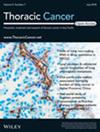重温 ALK (D5F3) 免疫组化:洞察病灶染色和神经内分泌分化
IF 2.3
3区 医学
Q3 ONCOLOGY
引用次数: 0
摘要
背景筛查无性淋巴瘤激酶(ALK)重排的非小细胞肺癌(NSCLC)对于确定符合靶向治疗条件的患者至关重要。经 FDA 批准的 ALK (D5F3) 免疫组织化学 (IHC) 检测法与 OptiView 扩增试剂盒一起使用,在检测这些患者方面具有极佳的灵敏度和特异性。然而,由此产生的局灶阳性的临床意义仍不明确,而且在一些神经内分泌分化病例中观察到了与ALK融合无关的ALK(D5F3)表达。本研究旨在通过分子检测验证这些发现,并为准确解读ALK(D5F3)IHC结果做出贡献。方法采用ALK(D5F3)IHC对1619例确诊为NSCLC和神经内分泌癌的患者进行评估。结果 1109 例腺癌中的 7 例(0.6%)和 289 例鳞状细胞癌中的 6 例(2.1%)表现出强局灶性 ALK (D5F3) 表达。在209例神经内分泌癌中,有9例(4.3%)表现出ALK(D5F3)的均匀强表达。结论本研究表明,ALK(D5F3)强但局灶性的免疫染色和在神经内分泌分化中的强表达可能并不表示 ALK 融合。考虑到这些发现,我们可以通过最大限度地减少对 ALK (D5F3) 染色的假阳性解读来提高靶向治疗患者选择的准确性。本文章由计算机程序翻译,如有差异,请以英文原文为准。
Revisiting ALK (D5F3) immunohistochemistry: Insights into focal staining and neuroendocrine differentiation
BackgroundScreening for anaplastic lymphoma kinase (ALK) rearranged non‐small cell lung cancer (NSCLC) is crucial for identifying patients eligible for targeted therapy. The FDA‐approved ALK (D5F3) immunohistochemistry (IHC) assay, used with the OptiView Amplification Kit, demonstrates excellent sensitivity and specificity in detecting these patients. However, the clinical significance of resulting focal positivity remains unclear, and ALK (D5F3) expression unrelated to ALK fusion is observed in some cases of neuroendocrine differentiation. This study aims to validate these findings with molecular testing and contribute to the accurate interpretation of ALK (D5F3) IHC results.MethodsA total of 1619 patients diagnosed with NSCLC and neuroendocrine carcinoma were evaluated using ALK (D5F3) IHC. For cases with strong but focal expression and those with diffuse strong positivity in neuroendocrine differentiation, ALK fluorescence in situ hybridization (FISH) and/or next‐generation sequencing (NGS) tests were performed.ResultsSeven out of 1109 adenocarcinomas (0.6%) and six out of 289 squamous cell carcinomas (2.1%) exhibited strong focal ALK (D5F3) expression. Nine out of 209 neuroendocrine carcinomas (4.3%) showed homogeneously strong ALK (D5F3) expression. All these cases, including adenocarcinoma with neuroendocrine differentiation and combined small cell carcinoma, were negative for ALK fusions by FISH and/or NGS.ConclusionThis study demonstrates that strong but focal ALK (D5F3) immunostaining and strong expression in neuroendocrine differentiation may not indicate ALK fusion. By considering these findings, we can improve the accuracy of patient selection for targeted therapy by minimizing false‐positive interpretations of ALK (D5F3) staining.
求助全文
通过发布文献求助,成功后即可免费获取论文全文。
去求助
来源期刊

Thoracic Cancer
ONCOLOGY-RESPIRATORY SYSTEM
CiteScore
5.20
自引率
3.40%
发文量
439
审稿时长
2 months
期刊介绍:
Thoracic Cancer aims to facilitate international collaboration and exchange of comprehensive and cutting-edge information on basic, translational, and applied clinical research in lung cancer, esophageal cancer, mediastinal cancer, breast cancer and other thoracic malignancies. Prevention, treatment and research relevant to Asia-Pacific is a focus area, but submissions from all regions are welcomed. The editors encourage contributions relevant to prevention, general thoracic surgery, medical oncology, radiology, radiation medicine, pathology, basic cancer research, as well as epidemiological and translational studies in thoracic cancer. Thoracic Cancer is the official publication of the Chinese Society of Lung Cancer, International Chinese Society of Thoracic Surgery and is endorsed by the Korean Association for the Study of Lung Cancer and the Hong Kong Cancer Therapy Society.
The Journal publishes a range of article types including: Editorials, Invited Reviews, Mini Reviews, Original Articles, Clinical Guidelines, Technological Notes, Imaging in thoracic cancer, Meeting Reports, Case Reports, Letters to the Editor, Commentaries, and Brief Reports.
 求助内容:
求助内容: 应助结果提醒方式:
应助结果提醒方式:


